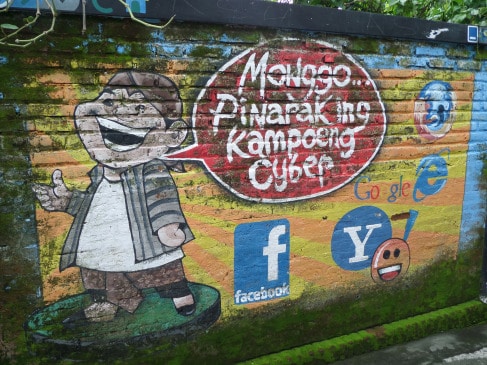Today’s post was originally published on June 3rd, 2014, as part of last summer’s fieldwork thread. Next week we’re sharing some of the fruits of our recent call for fieldnotes with you, and while we’re getting ready for that, let’s revisit some great old reads!
Today at Allegra we are pleased to kick-start our summer thread on Fieldwork! In the weeks and months to come we want to offer inspiration to all those/us enjoying the luxury of continuing projects disrupted by worldly ‘noise’ of teaching & administrative work by both experiences of newcomers into this time-honored rite of passage in our noble discipline, as well as the veterans returning to their beloved fieldsites. To set things going, we revisit a post that made some blogosphere-noise a while back, namely Jessika Tremblay’s 10 Tips For Surviving Anthropological Fieldwork. But first, a few thoughts by her on fieldwork & blogging!
Jessika Tremblay – if we’ve understood you correctly, you are still continuing your fieldwork, and have now spent more than a year in Java. We’ve read your 10 Tips to Surviving Fieldnotes – which you have also graciously permitted us to repost here as the inaugural of Allegra’s Fieldwork thread. Thus we know a few things of your research already, but would you still take us back to the basics: how would you describe yourself – who are you exactly, why did you end up going to Java and what exactly have you been doing there?

I’m a PhD candidate in the department of anthropology at the University of Toronto in Canada, and have been studying anthropology for roughly 11 years, starting with my undergraduate and Master’s degrees at McGill University. When I started my PhD I had this fantasy that I would do my year of fieldwork in the steppes of Mongolia, living in a yurt and eating Yak cheese all day, but when a funding opportunity came up to do a pilot study in Indonesia, my supervisors, who are experts on Indonesia, suggested I give it a try. So in 2012 I spent six weeks learning Bahasa Indonesia, the national language, and another three months traveling to scope out a potential field site that would allow me to research the role of the internet and new media on socioeconomic development. During that time I accidentally came across an urban neighbourhood in Yogyakarta, in central Java, that branded itself as a “cyber village.” I immediately became enthralled and with the support of its leader and wonderfully warm residents, I later decided to make it my field site. I returned home for 8 months to prepare an official research proposal, and came back in 2013. Since then I’ve been doing a lot of what anthropologists like to call “deep hanging out,” which means getting to know residents as well as possible and absorbing the cultural landscape, in order to provide depth and context to more pointed interview questions that I periodically undertake with locals.
Your blog is dedicated to your fieldwork, with the ambitious goal of covering your entire fieldwork period. How did you initially come up with this idea; was this something encouraged by your home institution, for example – or have you (no insult meant, we aspire to be ones ourselves!) always been a bit of a computer ‘geek’?
I’m definitely not a computer a geek, by any means. Some may find that ironic since my research topic is so deeply associated with technology, but I think having a humble connection with computers has helped me to focus more on its social, rather than technical aspects.
In fact I was directly inspired by another blog by a team of scholars working on a large-scale project investigating the social impacts of social media in nine different field sites around the world. Daniel Miller, a prominent anthropologist known for several works including his 2011 book “Tales from Facebook,” and his team have been documenting their research through their blog entitled: “Global Social Media Impact Study Blog.” I had been thinking about writing a blog for a while but was hesitant, thinking it wasn’t considered “scholarly” to do so, but when I saw the professionalism and usefulness of sharing work in progress, especially of anthropologists doing work similar to mine, I realized I was letting a wonderful opportunity to share ideas slip away.
It immediately became apparent to me that blogging had the potential to widen my network of contacts with similar research interests, encouraging an exchange of ideas and constructive criticism, and just as importantly broadening my audience to the general public.
So after several months of emersion in my field site I began typing away and experimenting with WordPress to see what I could come up with. It’s definitely nerve-wracking to put such raw ideas out in cyberspace before they’ve been polished, but it’s a great way to get feedback before attempting to put them into more traditional forms of print, like journal articles or a dissertation.
Now that you have been keeping a fieldwork blog, what has that experience been like? We at Allegra have of course experimented with this ourselves, and quite enjoy it: having concrete deadlines, even if self-imposed ones, adds a useful boost toward getting all those fieldnotes actually written – and it is also nice know that someone might actually read them.
Writing serves as a useful way toward starting analyses. What of your primary observations?
The most rewarding experience for me has been, like you suggested, starting more in-depth analysis in the middle of field work. One of the most challenging things for me during this past year has been taking a step back once in a while, in the middle of all the data gathering, socializing, stressing, and just living the experience, to think about what all of this raw data really means. Blogging has given me a chance to do that.
I like to mix raw ideas with some basic theory when I write my blog as a way to test the waters, so speak. Sometimes I get feedback from experts in the field that I otherwise might never receive, or only after my dissertation is complete.
If I wasn’t keeping up this blog I would have less motivation to start putting analytical ideas down on the screen first (paper? Who uses paper anymore?) because unfortunately my field notes tend to be much more descriptive than analytical. It’s also, indeed, a lot of fun to spend time crafting a post and including photos to share with people like my family and friends back home who only have a general idea of what it is that I’m doing way over here on the other side of the world. It’s kind of a justification for questions I often get like “when will you finish your studies?” or “when will you get a job?”

What kind of feedback have you gotten from your blog? Have people noticed it in a manner that you hoped (we dare not ask any concrete page view numbers as that may be a bit delicate among bloggers … we’re not quite sure of the etiquette yet!)
Feedback has been hit-and-miss. I’ve only been blogging for a few months and I am still learning about the best ways to get readership. Obviously, for someone who is used to an academic, and sometimes pedantic, style of writing, getting non-academics to read my stuff is a struggle.
I tend to post links to my new posts on Facebook, Twitter, and other social media sites to get as many reads as possible. The other problem is that there are a limited number of people who are interested in the same kind of stuff that I write about, so that I have had to adapt and try to find ways to make my blog posts more interesting to the general public.
Why would anyone want to read about the theoretical underpinnings of the place of technology in the production of culture when they could just as easily browse an article about why complaining through Twitter updates may have social value? Through blogging, I’ve begun to appreciate how style and packaging, or branding, are just as important as content. I was really surprised when I saw that my last post outlining 10 Tips for Surviving Fieldwork got exponentially more hits than any of my previous posts. I quickly realized that it was more tailored to a broader audience than just the handful of academics that research social media. That’s not to say that I think content should be compromised or “dumbed down” in any sense, but that it’s important to understand who it is we are writing for in order to get the hits we hope for.
What would your tips be to all those planning a) fieldwork; b) fieldwork blogging? Do you have any regrets – things you wish someone had told you before you started running the blog?
I think the most important thing to consider when planning to undertake fieldwork is to make sure you are taking on a project that you can handle. Each person has their own personality and limits. While some excel at socializing for hours on end, seeking out large numbers of contacts and informants, others become quickly exhausted after a one hour interview. Some people are thrilled with the adventure and danger associated with risky research locations, such as remote or conflict zones, while others thrive in safer urban conditions.
Be honest with yourself and try to find ways to test your limits before you pick a field site, because taking on more than you can handle can cause a lot of problems very quickly. Adaptability is of course a key asset for any anthropologist, but if you are lucky enough to try short research trips before taking on a full year or more, do so!
Fieldwork blogging is obviously limited to those who are doing research in locations with reasonable internet connections. In my case that’s not a problem since I’m studying a “cyber village” where most households have fast internet access. I think reasonable advice here is to think about a hole in the blogging community and see if you can fill it. What can you bring to the blogosphere that isn’t there already, and how can you make it palatable to a general audience? And don’t overthink it. Professionalism is important, but take the opportunity to test the waters and seek out feedback rather than just trying to impress the world with your polished thoughts right away. I’ve gotten more out of it that way.
My only regret is not starting earlier on. I arrived in Indonesia in April 2013 and started blogging some time in December (though I only started systematic data gathering in September, after language training). I would have benefited from writing about initial impressions as a way of documenting changes in my analytical viewpoint deeper into my fieldwork.
What about your blogging future? Are you done with the social media or do you have big ambitions for future plans? What about your take of the ongoing scholarly social media revolution – as a dedicated blogger, what is your take of our collective social media future?
I haven’t really thought about my blogging future, but I imagine it will continue in some form or another as I return to Canada and try to make more sense of my data. I think perhaps as I start to work on publishing articles and visiting conferences with more regularity, it will be a useful forum for sharing my research, though it might have to take a different form than the more colloquial style of a fieldwork blog.
I think there will always be a struggle to legitimate blogging as a productive way to communicate academic research through more “informal” media. I don’t think blogging is either a hindrance or a blessing to academics or readers, but it is definitely a useful adaptation, if pursued productively, for sharing information that might otherwise be limited by cost or legal red-tape.
Overall blogging has been a rewarding and fun way to get people take notice of my work, and I recommend it to those who are seeking a lighter outlet than the sometimes limiting traditional academic media.
Warm thanks for these views, and also, once again, for allowing us to repost your great tips. Here thus useful guidance for first-timers in fieldwork, and welcome reminders of basics to veterans. We wish you a most enjoyable completion for your fieldwork, and of course look forward to your future writings!
Here are the original 10 Tips for Surviving Fieldwork in annotated form – for the elaborated ones, click here. Let them be instructional for the first-time fieldworker & inspirational for the veteran making one more re-entry! And do share your experiences with us!
1. Choose a site you won’t hate
2. Learn the language
3. Pay attention to gender norms
4. Don’t take things so personally
5. Harness the power of your introversion
6. Have fun!
7. Find a routine that works for you
8. Keep a log book
9. Never reject an invitation (within reason)
10. Become a foodie






